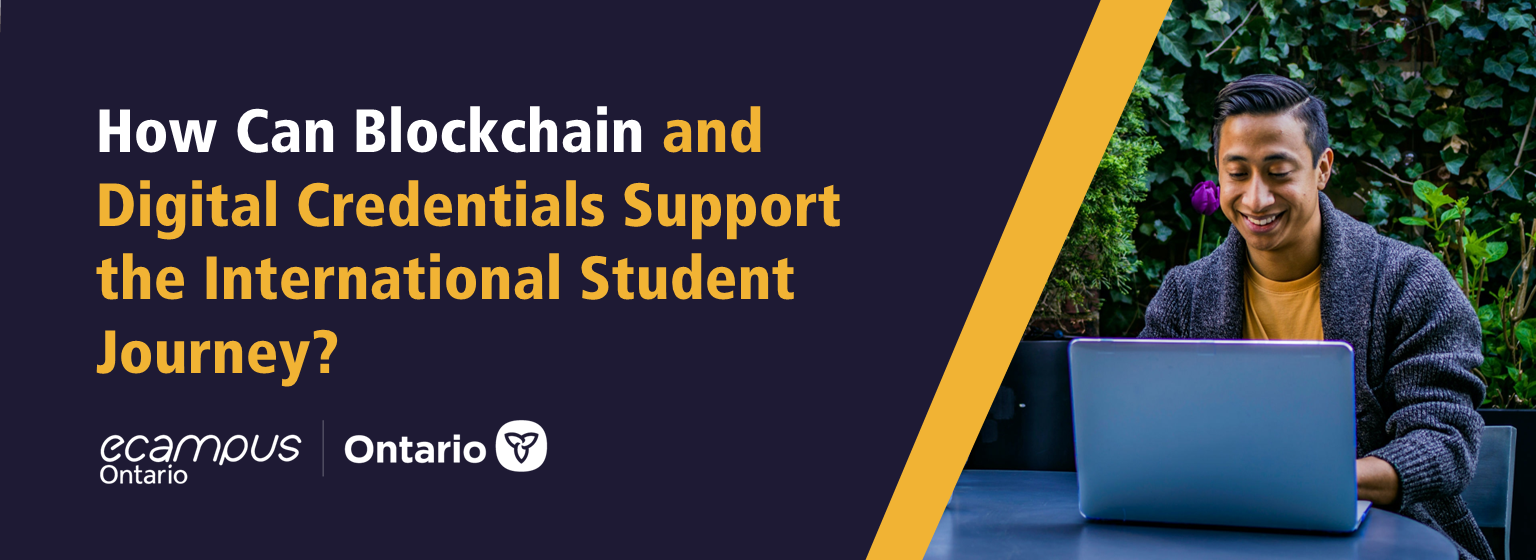
How Can Blockchain and Digital Credentials Support the International Student Journey?
Written by Alexander Hughes, Associate, Research and Foresight, and Janine Stowe, Research and Foresight Assistant, eCampusOntario.
The challenges experienced by some international learners in Canada could be aided by emerging technologies like blockchain and digital credentials.
In 2022, Canada took in over 800,000 international learners, many of whom continue to face numerous challenges when pursuing postsecondary education in Canada, from navigating cultural differences, to finding suitable housing. Recent reports show an additional obstacle for international learners, with students facing disenrollment and deportation because of the alleged actions of postsecondary immigration consultants abroad. Some learners have reported consultants have taken advantage of their lack knowledge of the Canadian immigration system, shared false information and fraudulent documents, and charged exorbitant fees for their services. This has fuelled a growing concern about the forgery of acceptance letters and enrollment documents used to obtain student visas in the process of international student recruitment.
Technology can help protect international students from fraud. Emerging technologies like blockchain and digital credentials have important roles in protecting international learners from predatory practices and fraudulent letters.
With blockchain and other digital credentials, an international student’s credentials, including their invitation letters, visa status, enrollment status, and other important documents, can be securely stored and accessed by authorized parties such as postsecondary institutions, immigration officials, and employers. These digital credentials can be validated quickly and easily, ensuring that the information is accurate and up-to-date. This has significant potential to enable international learners to have peace-of-mind regarding acceptance letters and other documents required for student visas.
The accelerated development and integration of new technologies like blockchain and digital credentials are fundamental to alleviating pressures and protecting and empowering learners.
eCampusOntario’s foresight report, Designing Education for the Future touches on the future role of Web3 and its ability to provide a more secure way to store and share academic records that better facilitate international study. Our research report, Wallets, Passports Portfolios, Credentials: What Learners Want in a Virtual Education Wallet explores learner perceptions of digital credentials and virtual wallets to inform the potential uses, design features, and requirements for a virtual wallet system. These reports provide a blueprint for using digital credential systems to support international student mobility.
The future of Web3 and digital credentials is here. In Spring 2023, McMaster University will issue all graduates a digital version of their diploma anchored in blockchain technology. Resources like EducationOntario.com, a project funded by Ontario’s Virtual Learning Strategy, help provide international learners with all the information they need to apply and study at an Ontario postsecondary institution. This includes learning online before they arrive, and important information for what they need to know before they set out for Ontario – from visas to acceptance letters – as well as studying and living tips.
Similarly, Ontario’s colleges have created common sector-wide standards to strengthen the programs and supports for international students – from ensuring the marketing of programs to international students is accurate and transparent, mandatory training for international agents working for Ontario’s colleges, and ensuring information on services, supports and facilities are provided to students before they arrive in Ontario and continue when they are in the province.
With the needs of International learners critical to the sector, these extant tools could help maintain Ontario’s competitiveness as a destination for postsecondary education. As new challenges and barriers to recruitment arise, the province’s institutions are uniquely positioned to derisk the enrolment process for prospective students, making Ontario the preferred destination for international learners and offering pathways to immigration.
About eCampusOntario Research and Foresight
eCampusOntario’s research and foresight is helping Ontario’s postsecondary institutions to embrace digital transformation and the future of postsecondary education. We encourage you to read our research and foresight reports to learn how blockchain and digital credentials can support transparency in the postsecondary sector.
Let’s start a conversation. Connect with us to discuss your institution’s role in the digital future.
